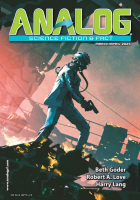firstwriter.com's database of magazines includes details of 2,203 English language magazines from around the world. The database is continually updated: there have been 32 listings added or updated in the last month, and the database was last updated yesterday, May 20. With over a dozen different ways to narrow your search you can find the right magazine for your writing, fast.
News

Richard Benson, the former editor of the Face magazine, has been announced as the editor of a new literary magazine and platform for working-class writers, titled the Bee.
Supported by Faber and actor Michael Sheen, the Bee aims to "fight the increasing marginalisation of working-class writers, and of working-class people in publishing".
Its channels include a website, a podcast and a literary magazine publishing both fiction and non-fiction. The organisers will also run an outreach programme, seeking out new writers from working class backgrounds and supporting their professional development.
"Justice and fairness demands that people from the less well-off sections of society have the chance to tell their stories, and to get them heard," Benson said. "But it’s also about common sense. Much of the important writing being done today, and so many of the best-loved stories come from ordinary working people. So often, it’s stories from the working classes that express what’s really happening in the world."

Alfred Hitchcock’s Mystery Magazine, Analog Science Fiction and Fact, Asimov’s Science Fiction, Ellery Queen Mystery Magazine, and The Magazine of Fantasy & Science Fiction have been acquired by Must Read Magazines, a division of a new publishing company, Must Read Books Publishing. All editorial staff from the magazines have been retained in the acquisitions. Jackie Sherbow has been promoted to editor of Ellery Queen Mystery Magazine. P.L. Stevens joins the group as publisher.
From Stevens’ statement to Locus:
There are writers who have posted online asking if the magazines have somehow been taken over by unusual interests and we want to reassure people that’s not the case. Ultimately the magazines’ content will remain editorially driven as they have always been, and they might be interested to know that one of our largest single outside financial backers, Michael Khandelwal, is a lifelong regional con attendee (more below). We feel these magazines are extremely important to the legacy and future of these genres, and hope to continue each magazines mission while updating the business behind the magazines in order to reach more readers and writers. The acquisitions were necessary for the magazines to survive and hopefully thrive in the changing publishing economy….
In recent years, magazines have faced significantly rising costs and lower payments from certain retailers.
The company plans to bolster the magazines by expanding their distribution in trade bookstores, increasing their digital footprint, investing more in marketing the magazines to new readers and writers across channels, and using their platform to promote genre fiction authors in general….
As always, the creative missions of the magazines are driven by their longtime editorial staff.

Horse stories in the morning, erotica in the afternoon
When people ask what I do for a living, I’m faced with two choices: either I can lie or I can bore them with the truth, which is too complicated to explain succinctly. While those around me have normal, definable jobs—accountant, journalist, engineer—my work requires headings and subheadings to get it across properly: a map of overlapping gigs and contracts.
“What do you do?” It’s a simple question that often gets asked on first dates. No matter how much I pare down my reply, it’s always long winded.
“Well, I’m a freelancer,” I start, “so I have a million little jobs . . .”
The first of my million little jobs is what I call “Horse News.” It works like this: every weekday, I wake up at 6 a.m. and make my way to my desk, stumbling and still half asleep. I flick on an old lamp and wince as my eyes adjust to the light. I turn on my computer and use a piece of software that shows me all of the American horse racing–related news from the past twenty-four hours. It pulls up radio clips, Fox News segments, and articles from publications called BloodHorse or Daily Racing Form—anything that could be relevant to my interests.
I sift through countless story summaries, many of which sound fake. Army Wife defeats Crazy Beautiful Woman in race! Another doping scandal emerges in Northern California! A disgraced-but-very-good trainer is no longer banned from the track! A famous YouTuber has invested millions into a betting app! I compile the important stuff into a newsletter: stories about track renovations, big events, the series of horse laws that were passed, then repealed, then approved again in 2023.
Articles

Reading the mission statements of Irish literary journals, a common theme emerges: the desire to offer writers the space to develop ideas that may not otherwise find a platform. From the more established titles such as Dublin Review, Crannóg and The Stinging Fly, which published its first issue 20 years ago this month, to more recent outlets like The Bohemyth, Banshee and gorse, fostering talent new and old is the backbone of “the little magazine”.
A vibrant journal scene with a roots-up feel to it has developed in Ireland in the past decade. There are currently in the region of 30 publications across print and online media seeking submissions multiple times a year. This has coincided with a growing enthusiasm for creative writing in general, with all of the major colleges in Ireland and many other cultural organisations offering programmes ranging from evening courses for beginners to two-year MFAs (Master of Fine Arts).

At CNN, Leah Asmelash laments the demise of many “long-standing” literary magazines. “The Believer,” she writes, which was started in 2003, “was once at the top of the literary magazine game. A leading journal of art and culture, the Believer published the work of icons like Leslie Jamison, Nick Hornby and Anne Carson. It won awards, it launched careers.” But the University of Nevada, which has housed the magazine since 2017, announced that it was shutting it down: “In a statement explaining the decision, the dean of the school’s College of Liberal Arts called print publications like the Believer ‘a financially challenging endeavor.’”
Oh, boy. Leslie Jamison, an icon? The Believer, a publication that “launched careers”? The only thing missing here is some theme music and a “CNN exclusive” or two.
Asmelash goes on to write about a handful of literary magazines housed at universities with MFA programs that are also shutting down — the Alaska Quarterly Review and the Sycamore Review, among others. We get the predictable “It wasn’t always this way” about halfway through:
Australia’s literary journals are produced in a fragile ecosystem propped up by a patchwork of volunteer labour, generous patrons and, with any luck, a small slice of government funding.
The Sydney Review of Books, the Australian Book Review and Overland were among a group of publications who sought four-year funding from the Australia Council in 2020 but were unsuccessful.
These publications join the ranks of many others – among them Meanjin and Island – defunded by state or federal arts funding bodies in recent years.

For avid readers, sometimes books can lose their appeal. You might get burned out or are unable to find the joy in keeping up with all the latest book releases. You could take a break in reading altogether, but there are other opportunities to level up your reading skills while putting your eye for detail to good use. One of those opportunities to become a literary magazine reader.
I had the great privilege of reading for two literary magazines in the past — The Missouri Review and The Masters Review — and both experiences proved invaluable to me as a reader and writer. It opened up my eyes to the blood, sweat, and tears that editors and readers put into these small but mighty publications. From a writer’s perspective, it also created an added respect for editors.
Submit a listing
If you run, are involved in, or just know of a magazine not included in our magazines database, you can suggest a new listing by clicking here. You can also use this form for suggesting amendments to existing listings.
To view our inclusion policy, click here.






